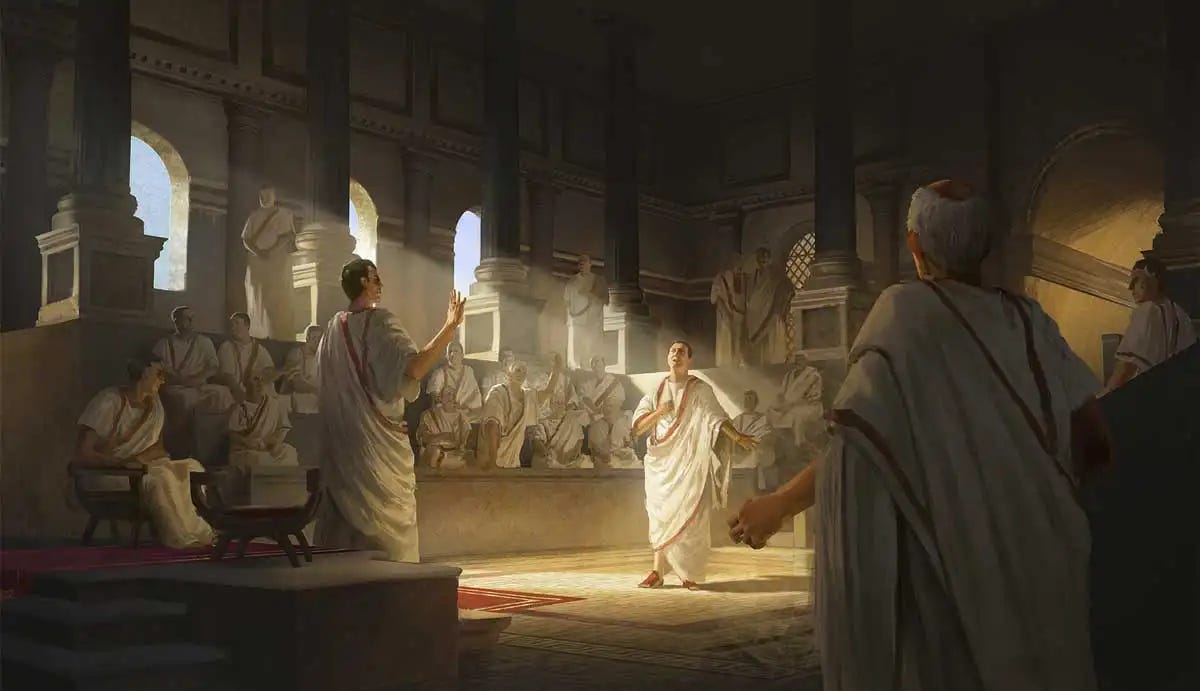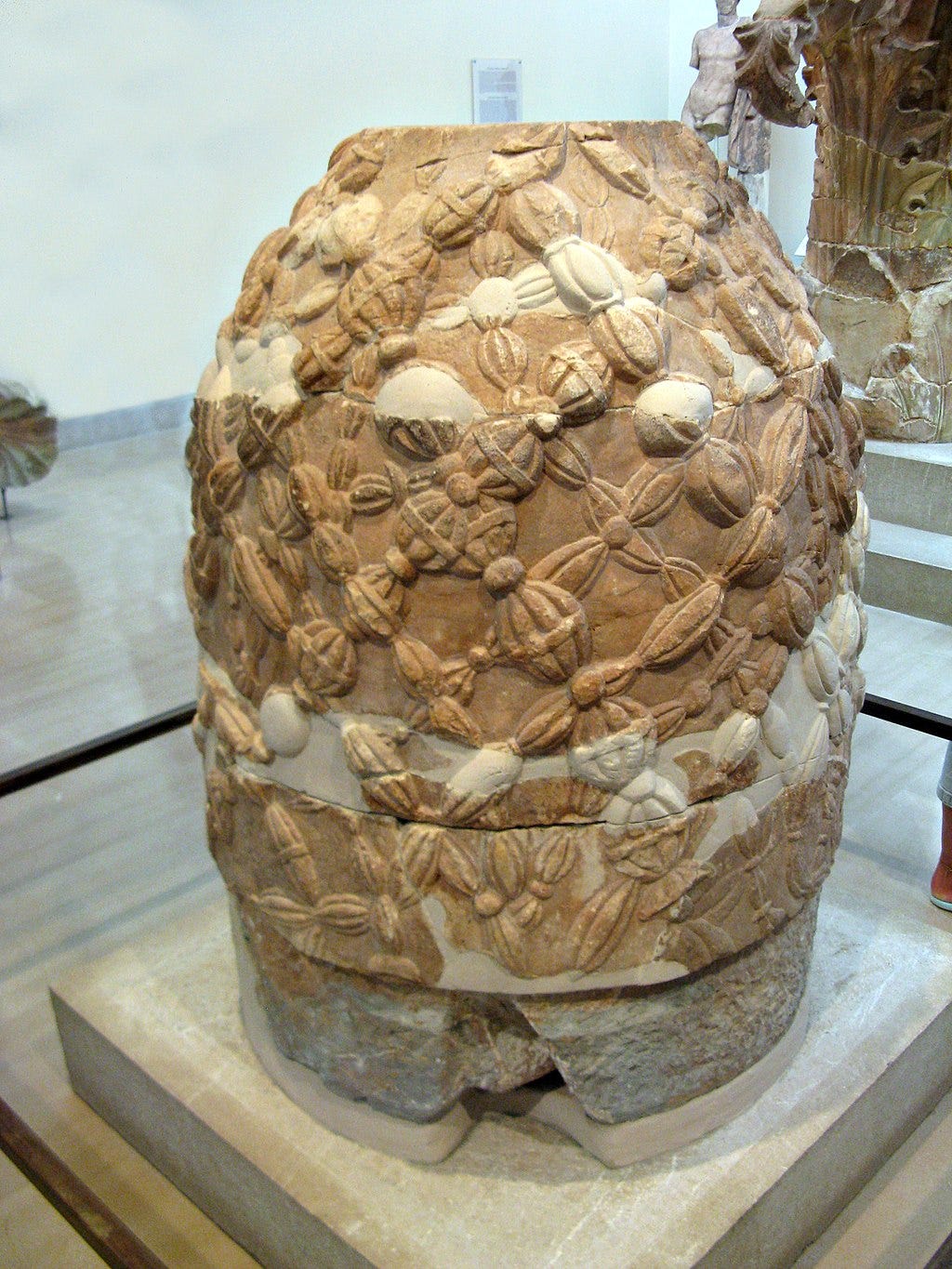Dear Classical Wisdom Reader,
Regular readers know that one of our favorite things to do here at Classical Wisdom is to show just how relevant the ancient world is in our here and now... that knowledge of the Classics can help us make sense of our current predicaments and that employing the lessons and insights gleaned from the ancients can prove essential in understanding just what in the world is going on...
And one way we do that is with our weekly Monday Mailbags.
Each week we take the hotly debated topics from the ancient texts as well as from the current headlines and see if our historical counterparts can help us better parse out the situation...
Let’s take, for example, the currently conversed question of dress codes.
For those not eagerly following the antics coming from the US Senate floor, they have recently announced that there are no longer any requirements regarding attire. The business look that has dominated the scene since inception is out - hoodies, sweatshirts, and those controversial calf showing shorts - are now permissible in the US capitol.
Of course the concept of a dress code is not new. The ancient had very strict rules for what each person - depending on their rank and status - could wear... especially the Roman senate.
While most are familiar with the Toga (and not just as an ideal last minute go-to Halloween costume), understanding its nuances, especially surrounding its rules of wear, takes a little more consideration. Firstly, it could only be donned by Roman citizens... and after that certain patterns and colors were permitted by specific members of society.
The emperor was the sole person to show off a purple toga, while senators could wear a white toga with a broad purple stripe along the edge, a distinctive badge of the senatorial order called the latus clavus. (Interestingly, the latus clavus is said to have been introduced by the legendary third king of Rome, Tullus Hostilius, after his conquest of the Etruscans).
Next, the equestrians (those who ranked directly under the senators) as well as senators’ children paraded togas with a narrow purple stripe, called a clavus augustus.
Everyone else (who was still a citizen) was differentiated by their social class by color—white for the uppers, natural or brown for the others.
While the toga was considered Rome's "national costume," and a privilege for Roman citizens, most Romans preferred the more casual, practical and comfortable clothing of the tunic for their quotidian attire. However, if wealthy, upwardly mobile freedmen aspired to ‘show off’ by flouting the Toga rules and publicly donning one, they would be kicked out of the event if they were ousted.
So you can see, they really were quite strict about the whole thing... and that high expectations in dress among the upper classes has been a long time running... But as we are often quick to point out, just because something is old, doesn’t necessarily mean it's good.
So let’s get back to the premise, shall we? What are we to make of the concept of dress codes in the first place? Do they elevate our standards? Or are they elitist restrictions? Do they help control and differentiate? Or maintain tradition and cultures?
And while we discuss the need for those who make the rules to sport a tie and coat or heels... What about the rest of us, the rest of the time? Do we need to look a certain way for the steakhouse? The museum? School or the plane? As our collective society slides to comfort and away from formality... should we embrace or halt this change?
Essentially, should we have dress codes?
As always, you can reply to this email or write me directly at anya@classicalwisdom.com and I’ll publish your responses in next week’s mailbag. In the meantime, you can enjoy the fascinating -and always diverse- replies to our last question: Should we navel gaze? Below.
All the best,
Anya Leonard
Founder and Director
Classical Wisdom
P.S. A small reminder that our Essential Greeks course is NOW ENROLLING.
We’ll begin with a welcome webinar in ONE WEEK, so make sure to check out the course covering Homer to Aristotle - as well as how to sign up - before then:
Monday Mailbag
Re: What good does Navel - Gazing do? Should we practice Omphaloskepsis?
I have honed this skill to the point of mastery. But the funny thing is, it's improved my efficiency. I chose to virtually give up books (tough), tv, beer, etc and empty the mind instead.
One of the great princes of Navel Gazing was well-respected tramp WH Davies. You might have seen his poem as below:
Leisure by William Henry Davies What is this life if, full of care, We have no time to stand and stare. No time to stand beneath the boughs And stare as long as sheep or cows. No time to see, when woods we pass, Where squirrels hide their nuts in grass. No time to see, in broad daylight, Streams full of stars, like skies at night. No time to turn at Beauty's glance, And watch her feet, how they can dance. No time to wait till her mouth can Enrich that smile her eyes began. A poor life this if, full of care, We have no time to stand and stare.
Best
Ron
[Ron: Can I just tell you that I had the pleasure of reading your email -and thus the poem- while waiting for a delayed plane flight. It was perfect.]
Well I like the word. It has something mythical in its form also. Something that goes around the total view of life, our own well from which we spring.
I like to contemplate, like the famous wordsworth said about that inward eye that reflects on the golden daffodils…..
greetings from HollandCor W.
navelgazer pur sang!
The navel resided at Delphi in the Temple of Apollo and marked the center of the universe. The connotation of Apollo as Apollyon the destroyer that resides in the bottomless pit of Hades itself. The Temple then was in essence worshiping a flavor of Satan as Apollo, who in turn is Apollyon. Apollyon is the Greek incarnation of Nimrod from Sumeria through Babylon. Baal is another name for this deity. Moloch is yet another version.
Moving forward to the modern world view, looking at the navel is an exercise of extreme pride. And indicative of a haughty spirit. The former leads to a fall in this case into the endless pit of Hades and the haughty spirit then to complete eternal destruction in that lake of endless eternal fire.
Based on this, the practice of navel gazing and the practice associated with it should be avoided in both thought and deed.
Charles F.
I am an expert at this. Since I was 6, I recognized navel gazing as a pleasant pastime. Now, 58 years later, it is my occupation and has been for over 15 years. And yes, it is frowned upon, even by me; but only when my Omphaloskepsis (or OS, as I like to call it) is particularly unproductive.
I started off 15 years ago, on a search to find my answer to the proper understanding of justice in the ancients. I had enough money, being independently middle class. I didn’t want to work at someone else’s command anymore. I had a lot of answers that needed questions. I didn’t find MY answer. I found Socrates’ answer. And Aristotle. Nietzsche came closest to mine, which left me somewhat appalled at myself. I was confused, which is the ultimate for interstellar OS.
So what was meant as an affirmation OS became an understanding OS. Don’t get me wrong, there is still always time for mundane OS. I spend far too much time OSing about gardening and baking instead of just doing it (of which I do a lot as well). But this understanding OS left me with far more questions amongst this quagmire of plurality in which we find ourselves. Not only the broad questions, because I found myself OSing, ‘who are you anyway, a man firmly embedded in this culture you lament, who are you to think you can answer?’
I knew what people were lacking but I was lacking it too. How does one live by Aristotle’s ethics when 50 years of habits have acquired under more Nietzschean ethics? We are living through dark ages brought on through nietzschean osmosis.
I have arrived, not too very long ago, at a couple of, I wouldn’t quite call them, conclusions; one personal and one cultural/political.
Personally, I decided that I needed to not only understand but to LOVE the virtues, if I were to be a better man. And I concluded there was no way that was going to happen without the grace of God. I needed to love my God so much that, through His grace, I change. Nothing saintly as of yet, but a loving work in progress.
Culturally, I am convinced that only through efforts like yours, educating and entertaining us through the classical treasures, will we ever come out the other end. It doesn't matter what form of government we have; it matters that we have true servants of the people in charge. And we don’t have any of those, at least those willing to re-enter the cave. (As Socrates said, expect to be ridiculed when you re-enter the cave. No thank you, I have enough ridicule.) We need to ‘grow’ those through classical liberal education at all levels. Check out St. Jerome's Academy in Hyattsville MD for a great example. When we start, we are more than a generation away from success. But it is the only way.
And it happened in chaotic Tuscany in the 1300/1400, with Petrarch as the father of the Renaissance. Along with Boccaccio, Bruni, Flavio et al, Petrarch ushered in an age of virtue rising to the forefront among leaders, regardless of the form of government. And Oh what the Renaissance hath wrought!
It started with teaching children not only to understand but to love virtue and hate vice.
Mike







Dress codes serve many functions, but one of them is as a means of showing respect for others. And another is to remind yourself as well as others of the gravity of some particular situation. Seems like both of these apply to the United States Senate.
I certainly agree about respect. Churches, museums, senates, schools..........in fact in some high schools you can't tell the younger teachers from the students! It not only shows disrespect for those institutions and those around you, but reeks of lack of self respect. Don't even begin to tell me about how those poor people who can't afford the "nice" clothes now feel empowered to visit museums and churches, because that just isn't so. Lowering the bar didn't mean a tidal wave of new patrons and users. If we all dress down then soon only those in uniform (officers of the law, military,etc.) will stand out which would make for a definite wrong-headed us/them mentality. If all authority figures dressed with a modicum of good taste and respect there would be more respect over all.
Certainly there can be exceptions to a code, but that's what they should be--exceptions, not the new norm. i.e. an emergency piece of legislation catches a lawmaker mowing the grass or (more likely) on the golf course, yes, they should come in all due haste clothed as they are if the vote is essential and going on now. And, of course, other better exceptions exist, but again, they are EXCEPTIONS, used sparingly and not the pre-cursor to a new and lesser standard.